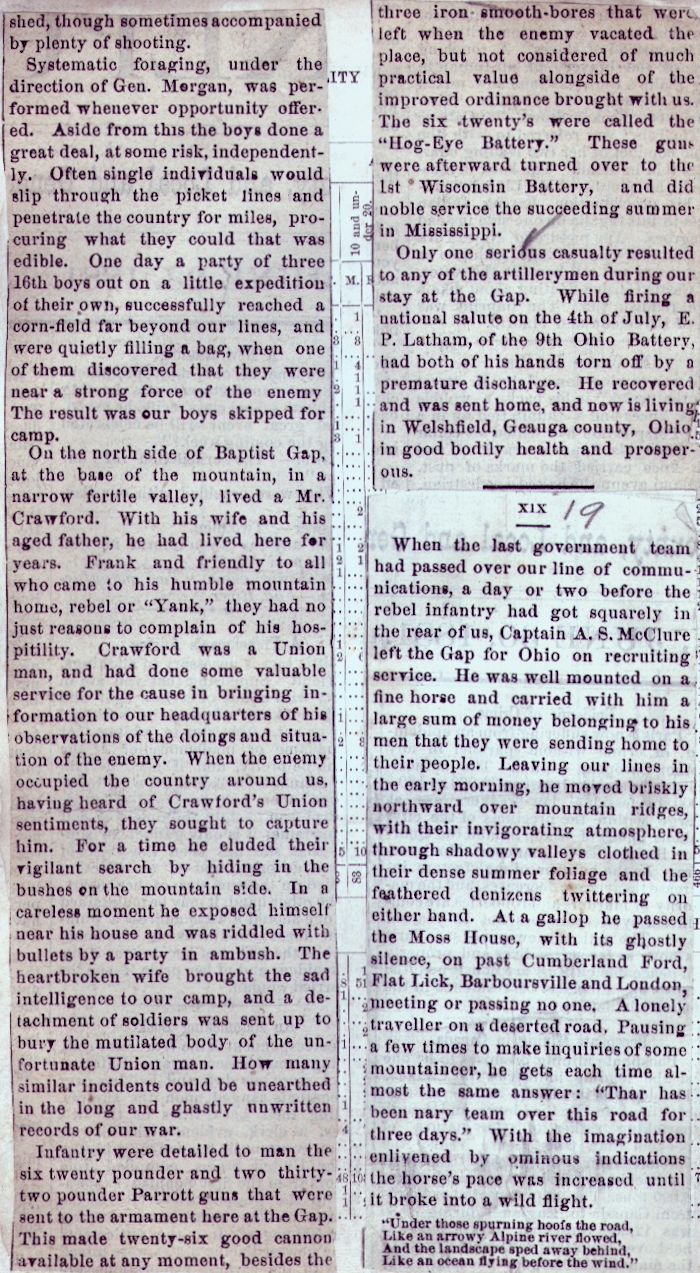| Camp & Field Page 31 | Camp & Field Index Page | 16th OVI Home Page | Camp & Field Page 33 |
The Camp & FieldArticles by Theodore Wolbach |
 Cpl. Theodore D. Wolbach |
The following image is taken from a book titled "Mortality and Statistics of the Census of 1850" in which it is believed retired Captain Rezin H. Vorhes, Company H, pasted over the pages a series of articles written by Cpl. Theodore D. Wolbach, Company E, titled "Camp and Field" and published, by chapter, in the Holmes County (Ohio) Republican newspaper from February 24, 1881 to August 17, 1882. The articles tell the story, in great detail and color, of the 16th OVI, from the inception of the 3-year regiment in October, 1861, through all its camps, battles and marches until it was disbanded on October 31, 1864. The articles pasted in the Vorhes book cover the first 35 chapters, published through October 20, 1881. All the remaining chapters were recently found in a Holmes County library by researcher Rob Garber who obtained copies, performed the transcriptions and provided to this website and which are also presented here, thus providing the complete work by Theodore Wolbach.
Throughout these articles click on the underlined white text for additional details.
The webauthor thanks 16th Ohio descendant Rob Garber for his excellent research on the Camp And Field articles and for performing the tedious digital transcription of those articles found on each page. The transcriptions were made to reflect the original articles verbatim, misspellings and all. Rob is the 3rd great nephew of Capt. William Buchanan, Company F, 16th Ohio, who served in the 90-day regiment as a private, re-enlisting in the three year regiment, and eventually making the rank of Captain of Company F. Thanks Rob!
Page 32 - Chapter 18, 19 - August/September, 1862
 |
shed, though sometimes accompanied by plenty of shooting. Systematic foraging, under the direction of Gen. Morgan, was performed whenever opportunity offered. Aside from this the boys done a great deal, at some risk, independently. Often single individuals would slip through the picket lines and penetrate the country for miles, procuring what they could that was edible. One day a party of three 16th boys out on a little expedition of their own, successfully reached a corn-field far beyond our lines, and were quietly filling a bag, when one of them discovered that they were near a strong force of the enemy. The result was our boys skipped for camp. On the north side of Baptist Gap, at the base of the mountain, in a narrow fertile valley, lived a Mr. Crawford. With his wife and his aged father, he had lived here for years. Frank and friendly to all who came to his humble mountain home, rebel or Infantry were detailed to man the six twenty pounder and two thirty-two pounder Parrott guns that were sent to the armament here at the Gap. This made twenty-six good cannon available at any moment, besides the |
three iron smooth-bores that were left when the enemy vacated the place, but not considered of much practical value alongside of the improved ordinance brought with us. The six twenty's were called the Only one serious casualty resulted to any of the artillerymen during our stay at the Gap. While firing a national salute on the 4th of July, E. P. Latham, of the 9th Ohio Battery, had both of his hands torn off by a premature discharge. He recovered and was sent home, and is now living in Welshfield, Geauga county, Ohio, in good bodily health and prosperous. Published in Holmes County Republican XIX When the last government team had passed over our line of communications, a day or two before the rebel infantry had got squarely in the rear of us, Captain A.S. McClure left the Gap for Ohio on recruiting service. He was well mounted on a fine horse and carried with him a large sum of money belonging to his men that they were sending home to their people. Leaving our lines in the early morning, he moved briskly northward over mountain ridges, with their invigorating atmosphere, through shadowy valleys clothed in their dense summer foliage and the featured denizens twittering on either hand. At a gallop he passed the Moss House, with its ghostly silence, on past Cumberland Ford, Flat Lick, Barboursville and London, meeting or passing no one. A lonely traveller on a deserted road. Pausing a few times to make inquiries of some mountaineer, he gets each time almost the same answer:
|
| Camp & Field Page 31 | Camp & Field Index Page | 16th OVI Home Page | Camp & Field Page 33 |